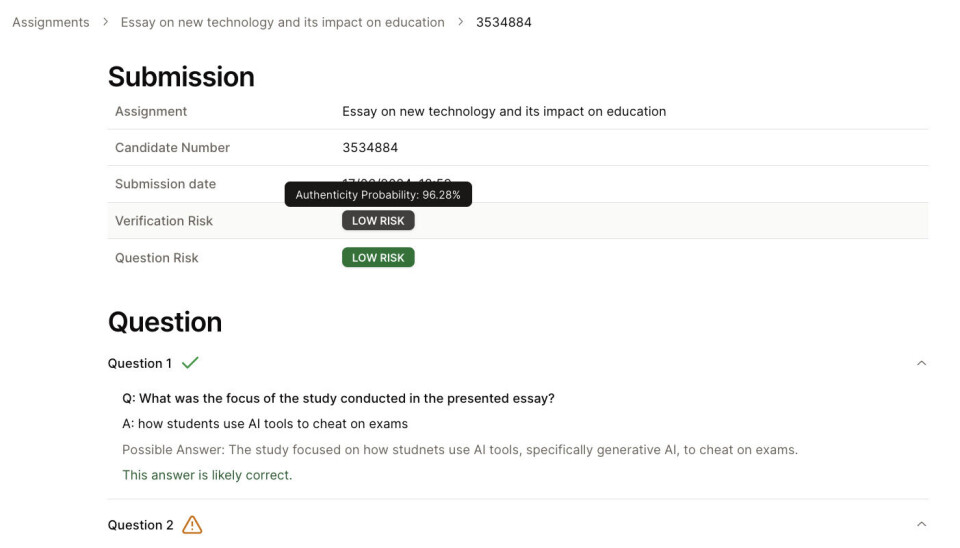Artificial Intelligence (AI) has made great strides in the education sector. There seems to be no easy way to detect students who are cheating using tools like ChatGPT.
Now IT entrepreneur Roger Larsen thinks he's found a solution. He is behind several IT companies for the education sector. Among other things, he is the founder of the learning platform Fronter, which has been used in universities and colleges in Norway and abroad and has gained millions of users.
He is also behind WeVideo, a video editing software, which states that they have 38 million users.
There are a number of so-called AI detectors, which are programs that are supposed to detect AI-generated texts. But several studies have shown that this is not particularly accurate.
Roger Larsen and his team have redefined the problem around exposing “ghost writers.” In other words, it is also possible that the student was paid to write an assignment for another student.
“When ChatGPT and other generative services become available, it will really just amplify another problem,” he says.
Sikt, a government provider of services to Norwegian universities and colleges, is also interested in tools that can detect cheating using artificial intelligence. But right now, they have no concrete plans to buy anything.
artificial intelligence
How to spot ChatGPT scams
this is the way
Roger Larsen has developed a two-step method to verify that this text is the student's own text.
First, a written test of approximately 300 words is given from the student. When a student submits an answer, it is automatically analyzed, compared to the test, and a report is generated. Larsen claims that in up to 99 percent of cases linguistic analyzes provide reliable confirmation that the text is the student's.
After the student uploads the text, she receives automatically generated questions for the text. They must be answered in real time, with a time limit.
“If you wrote the script, it would be very easy to answer,” Larsen says.
— Can't you use ChatGPT when replying?
– No, you don't have time for that. We also have light monitoring Which means we monitor activity in the browser, he says.
“Then the teacher or university has two reference points, completely independent of each other, but still able to give a very reliable assessment of whether the student is the real author,” he adds.

Plagiarism check on tenders
For the past eight years, Norwegian universities and colleges have used Ouriginal to detect text similarity. This is owned by the American company Turnitin.
It was Original who prosecuted the fraud cases of ministers Sandra Burch and Ingvild Kirkwall. But today's solution has an expiration date and must be replaced.
Earlier this month, Seekt put out a tender for plagiarism checks for Norwegian universities and colleges.
The tender document states that Sikt is also interested in solutions that can detect the use of artificial intelligence.
— We demand a plagiarism tool that reminds us of the essence of what we have today. But we are open and curious about the elements of AI and AI discovery. Because here we like to think that there is an exciting development on the market, so we want to investigate this a bit openly, says Vegard Moen, who is the product area manager for tutoring services at Sikt.
“New cheating methods”
It is stated in the introduction to the tender document that the most important function of the system they require is to recognize text similarity in order to detect plagiarism.
But it also states that “it is important that the solution is continuously developed to take into account new cheating methods, for example the use of AI-generated scripts.”
“We ask for information about how they think and how they want to evolve to meet the AI challenge,” Moen explains.
The requirements specification says this about KI:
“Describe how the solution can support an organization’s efforts to avoid fraud when using non-original work, including AI-generated texts, and identifying different authors (contract fraud).”
When asked why they were a bit ambiguous about this, Vegard Moen replied:
-We don't really know what solutions exist. There is a lot of innovation going on now. There are many who believe that we are entering into an eternal race if AI wants to discover AI. This is new for both suppliers and us.
com. chatgpt
The student pointed to a company that does not exist. This made the sensor suspicious
Tones lower expectations
Regarding the tender process, Sikt also requested information from potential suppliers.
But according to Moen, they haven't had a “eureka moment” when it comes to AI detection tools.
It tempers expectations.
– Some AI discoveries will certainly be on the table during the purchasing process. But I think we'll be surprised if we find the “silver bullet.”
Sikt estimated the value of the plagiarism task at €3 million, just over NOK 34 million.
The duration of the assignment is three years, but with the possibility of extension.
Six employees
IT entrepreneur Roger Larsen's company doesn't sell a product yet, but Larsen says about seven universities in a similar number of countries are testing a pilot product.
— Now they are “piloting” it internally in their learning technology departments and validating whether they want to run it against students. We are now receiving positive feedback on it. Then it will be exciting when you have to test it on students.
He says they will also have independent research on the topic, running observational groups and designing research schemes, which will be published.
His company, Nor Education AS, has six employees and does just that. He says they have been working on the project for several years.
In Norway, they did not have the opportunity. Feedback is awaited from universities and colleges as the sector opts for a new anti-plagiarism system, which has now been put out to tender.
com. chatgpt
Scientists' reaction to what was stated in this article: — Is it possible!
– Interested in hearing everything
Vegard Moen at Sikt thinks Roger Larsen's concept sounds interesting.
— I've heard about this kind of solution, which creates a kind of signature. But I think we need to look into it a little bit. Because they could also be challenged by KI again, he says.
— We're interested in learning about anything that can address fraud-related AI challenges.
Roger Larsen says they are not qualified to bid themselves, because they do not have a plagiarism system. If they want to participate, they may have to be a subcontractor to another actor.
I think students should be monitored better
“Plagiarism checking has been overcome,” Jan Sverre Knudsen, a professor at Oslo Met, told Chrono in a recent article about AI in higher education.
Knudsen, who works on a kindergarten teacher training course, explained how students can use software to rewrite texts, thus fooling plagiarism checks.
He says he doesn't have a lot of experience with the tools needed to detect cheating using AI, but he says other faculty recently caught cheating using GPTZero software.
He believes that you will also go a long way by keeping close tabs on students.
-And then you get to know the students along the way and can guide them in writing assignments. He says that if they had regular contact with a teacher, I don't think they would suddenly find themselves handed a difficult text that wasn't theirs.
This is also an economic issue, he adds.
— With the rationalizations and cuts in teaching that have occurred in recent years, at least for us in kindergarten teacher training, this has become very difficult.
Policy
Sandra Burch: —I think everyone who writes a dissertation takes a little bit here and there, pastes it into a document and then writes it for themselves

“Web specialist. Lifelong zombie maven. Coffee ninja. Hipster-friendly analyst.”




